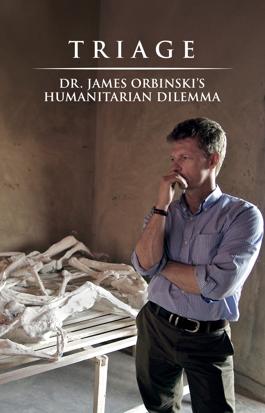Triage: Dr. James Orbinski's Humanitarian Dilemma
The act of triage is the ultimate humanitarian nightmare. Racing against time with limited resources, relief workers make split-second decisions: who gets treatment; who gets food; who lives; who dies. This impossible dilemma understandably haunts humanitarians like Dr. James Orbinski, who accepted the 1999 Nobel Peace Prize on behalf of Médecins Sans Frontières (MSF) as their President, and was a field doctor during the Somali famine, the Rwandan genocide, among other catastrophes. Having seen the best and worst of humanitarian assistance and of humanity itself, Orbinski embarks on his most difficult mission to date - writing a deeply personal and …
The act of triage is the ultimate humanitarian nightmare. Racing against time with limited resources, relief workers make split-second decisions: who gets treatment; who gets food; who lives; who dies. This impossible dilemma understandably haunts humanitarians like Dr. James Orbinski, who accepted the 1999 Nobel Peace Prize on behalf of Médecins Sans Frontières (MSF) as their President, and was a field doctor during the Somali famine, the Rwandan genocide, among other catastrophes.
Having seen the best and worst of humanitarian assistance and of humanity itself, Orbinski embarks on his most difficult mission to date - writing a deeply personal and controversial book that struggles to make sense of it all.
Leaving his young family behind in Toronto, Canada - where he's a university professor and doctor - Orbinski returns to Africa, revisiting the past and engaging with the present. He hopes that here, in the place where he witnessed humanity literally torn apart, he can rediscover the true heart of humanitarianism.
-
directorPatrick Reed
-
producerPeter RaymontSilva Basmajian
-
editorMichèle Hozer
-
photographyJohn Westheuser
-
sound recordingAo Loo
-
executive producerSilva Basmajian
-
musicMark Korven
-
production supervisorJanice Dawe
-
production managerNorma Mendoza
-
production coordinatorNida MarjiLaura BlaneyMichelle LatimerJulia BennettAnita CorsiniBrenda DarlingAnousheh ShowlehMichale RaskeLee Walker
-
researcherMichelle Latimer
-
additional photographyWalter Corbett
-
additional sound recordingPeter SawadeIan Challis
-
fixerMoise GatambiSolange NyamulisaWills Samati
-
interpreterMoise GatambiSolange NyamulisaWills Samati
-
translatorJean-Thierry NkulikiyumukizaHareda Bolis
-
assistant editorPhilip Wilson
-
graphicsPhilip Wilson
-
sound supervisorRussell Walker
-
sound editorJakob ThiesenSteve Payne
-
re-recording mixerIan RodnessSteve Payne
-
post-production supervisorPaula Talesnik
-
stills photographerSteve Simon
-
production accountantCandis Buder
-
online editorMichèle Hozer
-
archival researchPatrick Reed
-
legal affairsMartyn Krys
-
business affairsDel MehesNida Marji
-
additional musicK'naanThe Mighty Popo
-
post-production facilityKitchen Sync Digital AudioThe Cutting Factory
Humanitarian workers must sometimes work with the enemy to succeed in helping people—for example, in situations where food would be diverted otherwise, and people would die from lack of care. Some organizations, however, refuse to collaborate with perpetrators of genocide. What would you do? Write an op-ed piece, suitable for publication in a major daily newspaper, justifying your decision to work with (or refusal to work with) perpetrators of genocide to help a population.
More educational content
Triage: Dr. James Orbinski's Humanitarian Dilemma, Patrick Reed, provided by the National Film Board of Canada
